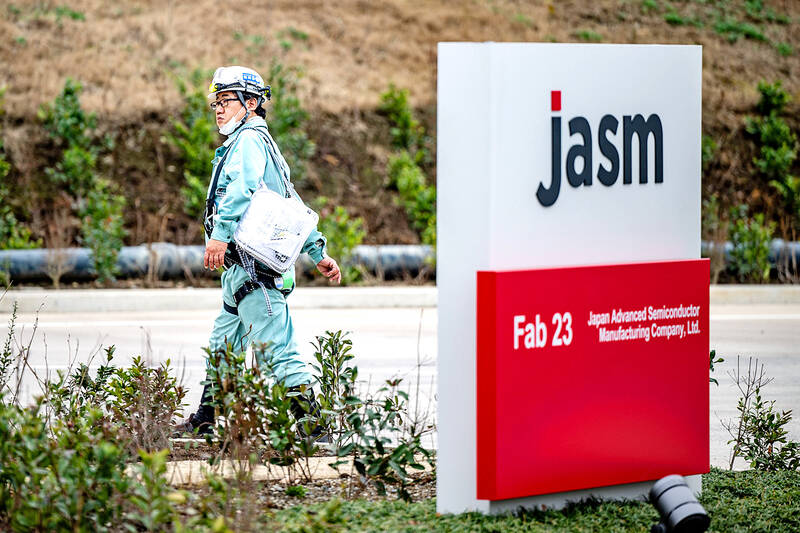Taiwan Semiconductor Manufacturing Co (TSMC, 台積電) yesterday obtained the government’s approval to inject an additional US$10.26 billion to finance the construction of its second fab in Kumamoto, Japan, and a second fab in Arizona, using advanced process technologies.
The Department of Investment Review approved TSMC’s investment applications on the basis that Taiwan remains a major technology and manufacturing hub for the chipmaker, which makes its most advanced chips at home, the company operates its research-and-development center here and the majority of its capacity remains in Taiwan.
The latest capital injections — US$5.26 billion for its Japanese venture Japan Advanced Semiconductor Manufacturing Inc and US$5 billion for TSMC Arizona Corp — would help the chipmaker deepen its partnerships with local supply chains and recruitment of skillful talent, the department said in a statement.

Photo: AFP
That would help safeguard the nation’s semiconductor industry’s competitiveness in the long term, the statement said.
TSMC’s second Arizona fab is to upgrade its process technology to 2 nanometers to support customers’ strong demand for artificial intelligence (AI) in addition to 3-nanometer technology, the world’s biggest contract chipmaker told investors in April.
The new Arizona fab is to enter volume production in 2028, about three years after the first Arizona fab ramps up production in the first half of next year, which was pushed back from an earlier schedule of late this year due to a lack of sufficient technicians and skilled workers.
The second Kumamoto fab is designed to produce chips from 6-nanometer to 40-nanometers used in automotive, industrial and high-performance-computing applications, TSMC said.
The construction is to start in the second half of this year, with volume production targeted by the end of 2027, it said.
The first fab in Kumamoto is to enter volume production of 12-nanometer, 16-nanometer, 22-nanometer and 28-nanometer chips in the fourth quarter of this year as scheduled, the chipmaker said.
Wire and cable maker Walsin Lihwa Corp (華新麗華) yesterday also won approval to invest US$160 million in its fully owned subsidiary in Singapore, Walsin Singapore Pte Ltd.
The department yesterday also gave the go-ahead to electronic components supplier Lite-On Technology Corp’s US$89.38 million plan to acquire equities of Japan’s Cosel Co (光寶科技), a producer of power supplies and noise filters.
The investment would allow Lite-On to indirectly own Cosel’s four Chinese units, the department said.

‘SWASTICAR’: Tesla CEO Elon Musk’s close association with Donald Trump has prompted opponents to brand him a ‘Nazi’ and resulted in a dramatic drop in sales Demonstrators descended on Tesla Inc dealerships across the US, and in Europe and Canada on Saturday to protest company chief Elon Musk, who has amassed extraordinary power as a top adviser to US President Donald Trump. Waving signs with messages such as “Musk is stealing our money” and “Reclaim our country,” the protests largely took place peacefully following fiery episodes of vandalism on Tesla vehicles, dealerships and other facilities in recent weeks that US officials have denounced as terrorism. Hundreds rallied on Saturday outside the Tesla dealership in Manhattan. Some blasted Musk, the world’s richest man, while others demanded the shuttering of his

Taiwan’s official purchasing managers’ index (PMI) last month rose 0.2 percentage points to 54.2, in a second consecutive month of expansion, thanks to front-loading demand intended to avoid potential US tariff hikes, the Chung-Hua Institution for Economic Research (CIER, 中華經濟研究院) said yesterday. While short-term demand appeared robust, uncertainties rose due to US President Donald Trump’s unpredictable trade policy, CIER president Lien Hsien-ming (連賢明) told a news conference in Taipei. Taiwan’s economy this year would be characterized by high-level fluctuations and the volatility would be wilder than most expect, Lien said Demand for electronics, particularly semiconductors, continues to benefit from US technology giants’ effort

TIGHT-LIPPED: UMC said it had no merger plans at the moment, after Nikkei Asia reported that the firm and GlobalFoundries were considering restarting merger talks United Microelectronics Corp (UMC, 聯電), the world’s No. 4 contract chipmaker, yesterday launched a new US$5 billion 12-inch chip factory in Singapore as part of its latest effort to diversify its manufacturing footprint amid growing geopolitical risks. The new factory, adjacent to UMC’s existing Singapore fab in the Pasir Res Wafer Fab Park, is scheduled to enter volume production next year, utilizing mature 22-nanometer and 28-nanometer process technologies, UMC said in a statement. The company plans to invest US$5 billion during the first phase of the new fab, which would have an installed capacity of 30,000 12-inch wafers per month, it said. The

Minister of Finance Chuang Tsui-yun (莊翠雲) yesterday told lawmakers that she “would not speculate,” but a “response plan” has been prepared in case Taiwan is targeted by US President Donald Trump’s reciprocal tariffs, which are to be announced on Wednesday next week. The Trump administration, including US Secretary of the Treasury Scott Bessent, has said that much of the proposed reciprocal tariffs would focus on the 15 countries that have the highest trade surpluses with the US. Bessent has referred to those countries as the “dirty 15,” but has not named them. Last year, Taiwan’s US$73.9 billion trade surplus with the US